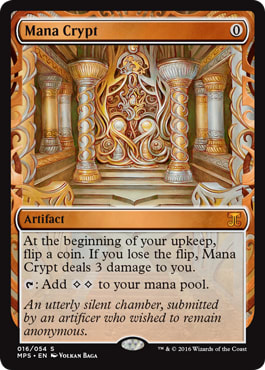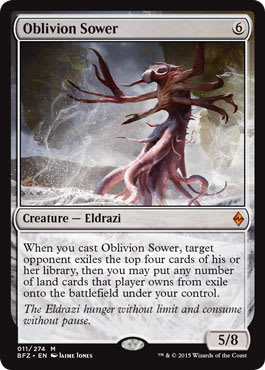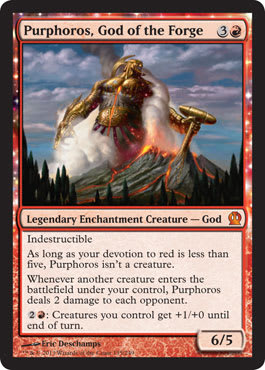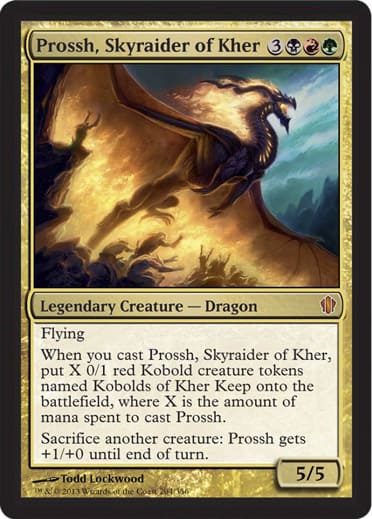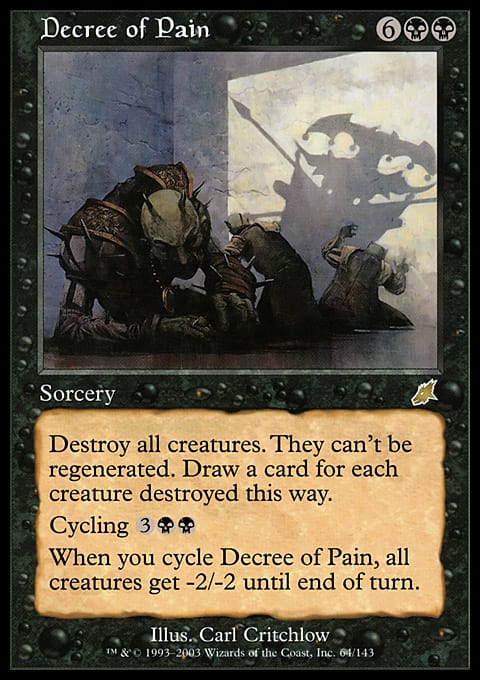Everyone is looking for a different kind of multiplayer game. Some want a thirty-second commercial of a game, others want a half-hour sitcom, but I always preferred a full-length movie of a game; I’m talking Lord of the Rings! Let me try to sell you on why a long game — one that goes at least an hour—is the best way to play Commander.
Before I get started, let me say this: I know that most people complain about games that go “too long”, and I know not all long games are equally fun, but if you love playing Magic then there shouldn’t be an automatic bias against playing Magic for longer. Consider this: Friday Night Magic is usually going to take three or four hours, a pre-release can easily take four or five, and a large scale tournament can take an entire weekend, often on top of a grueling travel schedule. Do you want to grind out four stressful rounds against a string of strangers, or would you rather sling cards with your best buds for three hours?
Everyone’s a Winner, Baby!
Imagine that you’ve just finished a game with your playgroup, and it ended early, somewhere between turn five and eight. Who do you think is most likely to have won that game? If your local metagame is like mine, you probably have a pretty good idea of who the winner could be. Maybe it’s That Guy, who loves combos more than anyone else in your group, or maybe it’s That Deck, which is overwhelmingly fast, and only comes out occasionally.1 I can pretty much guarantee that if one of my games ends that early I did not win it, because I don’t build my decks to do that. Simply put, those kinds of games aren't fun for me. 2
However, if a game goes long — maybe turn 20 or 30 — then there is a much higher chance that anyone at the table could’ve won it, because there is greater variance over time. That super-fast poison deck can still win it all, but the janky giant tribal deck also has a chance to get it done. The shorter the game, the more difference a small number of ‘overpowered’ or expensive cards can make — for example, I have owned a Mana Crypt since the Clinton administration, and I’ve won a few games because that early ramp allowed me to surge past a couple of lower-powered opponents and gain an insurmountable lead. If the game goes long enough, everyone has a chance to catch up, which reduces the impact of individual cards and individuals’ budgets.
More importantly though, a long game usually gives everyone a chance to shine. Maybe Adam powers out his win condition early and threatens to go all the way, but we beat him down, then Brandon emerges as The Threat and we need a concerted effort to take him out. That weakens the rest of the table enough that bruCe is able to cobble together a decent board state and take out a couple of guys with an enchanted Ornithopter. And he nearly gets away with it too, until Daryl . . . I mean, Daniel . . . draws the key card he’s been waiting for and seizes victory from the jaws of someone else’s victory. That’s what the long game means to me: a game where everyone has an impact on the game and everyone has at least some chance to win.
The Spice of Life
If everyone has an impact on the game then, regardless of the outcome, you are guaranteed to see more of what Magic has to offer. Everyone knows that Sol Ring and Solemn Simulacrum are among the ‘best’ ramp cards in the format because they’re so efficient, but what about recurring Oblivion Sower with Phyrexian Reclamation or Haunted Crossroads? If every deck gets a chance to stretch its legs and strut its stuff, then you'll see a greater variety of strategies in each game. It goes without saying that Rafiq of the Many is the quickest way to kill people in Bant, but sometimes it’s more fun to slow things down and see how many counters you can put on Jenara, Asura of War. 3 Swords to Plowshares and Path to Exile are, regrettably, the best spot removal ever printed, but if games go long enough then you’ll see the relative merits of cards like Rabid Bite and Silence the Believers instead.
The staple cards that we see in every game are staples for a reason: they are the most efficient ways to do whatever you’re trying to do. Usually ‘efficient’ means they have a low mana cost relative to their effect, which means they can be played earlier and win the game faster. The corollary of this is that shorter games offer less variety, because there are a limited number of ways to win quickly. If you start to focus on the long game, you’ll start to see that less common cards actually offer surprising advantages in power, versatility, or just style. Long games are the spice of life!
The Play’s the Thing
Full disclosure: the folks I play with say that if a game goes too long, I’m going to win it. There might be some truth to that, partly because I build my decks to grind out incremental advantage over time. But I think a big part of it is that I can (usually) keep my head in the game longer, and see how the cards that are being played at this moment are going to impact the endgame. Magic is a game of skill and strategy, and the longer a game goes, the more you have a chance to show your skills and plan your strategy.
Don’t get me wrong: there is plenty of skill in designing a combo deck, and it's a skill I’ve never mastered. There's also skill in getting your combo off against a table that is expecting it. But it requires a broader range of skills to negotiate a gradual path to victory. When and whom to attack, how much to commit and how much to hold back, when to use a key spell, which permanents to protect and which to sacrifice — these are decisions that you have to make every turn in multiplayer, and the longer the game goes, the more chance you have to gain a series of small advantages over each opponent by making the right decisions.
What’s the Alternative?
I’ve had quick games that were a ton of fun, and I’ve had long games that were miserable, drawn-out affairs that I just wanted to end. However, most of my long games have been more fun than most of my short games, in large part because short games offer less variety and fewer choices.
To illustrate, consider the shortest multiplayer game I’ve ever seen. It was a three-player game back in the really old days of Magic, and it went like this:
Player 2: Play Mountain, Mox Emerald, Black Lotus, Channel, Fireball the third player for 20, dropping to one life
Player 1 (EOT): Lightning Bolt Player 2, killing him.
That game was short, brutal, and epic! Everyone who played that game loved it, even the guy who lost, and I think we can all understand why. But one player only got to cast a single spell, and one player only got to decide whether to mulligan or not, so if every game was like that, what would be the point of playing? Sometimes you would win randomly because you got the combo-kill in your opening hand, and sometimes you would lose randomly because someone else got the combo in their opener. It hardly matters if you’re the best player in the world or a total rookie. 4
Modern Commander games aren’t usually that fast, but a game against any half-way decent Purphoros, God of the Forge deck can be over before most decks have a chance to warm up, and some commanders (I’m looking at you, Prossh, Skyraider of Kher!) can take out the first player by turn five, and then scythe through a different player every turn or two. That might be fun the first time you see the deck in action, but the more you play it, and certainly the more you play against it, the less fun it becomes. Also, now that anyone can find out what the most broken decks are, and even copy Commander deck lists off the Internet, a lot of the skill of building a really strong deck is reduced.
Sometimes a deck is so explosive that any stumble at all means you’re out of the game. Imagine if someone suits up a hasty Skithiryx, the Blight Dragon for lethal poison damage on turn five. Maybe you’re the only player without a flying blocker, so Skittles flies over and one-shots you out of the game; maybe nobody can stop it so the Skithiryx player rolls a dice, and then you lose the game because he rolls a two instead of a three. Neither game involves any of the rich interactions and complex decision-making that makes multiplayer Magic so much fun.
Conclusion
What that means for you is simple. If you have three hours for your gaming night, you can get in a half dozen Commander games, but perhaps only if the same decks win in the same ways that they always do. Or you might only have time for one or two marathon games, but remember that the lower quantity of games often means higher quality in terms of variety and strategy. Fewer games might mean fewer wins for you, but if everyone can do more in each game, then everyone wins.
So the next time a game goes long, I advise you to make the most of it. Pay attention to all of the different cards and decks that don’t always get a chance to shine. Look at your own card choices and ask yourself if a less efficient spell might actually be more effective in the late game — maybe Hex or Decree of Pain instead of Wrath of God, maybe Evangelize instead of Swords to Plowshares, maybe Phyrexian Ingester instead of Pongify. Stay alert, because every decision you make is a chance to grind out a little bit more value, which can ultimately mean the difference between winning and losing. And most importantly, remember that you're playing the best game in the world with a bunch of great friends!
1 My buddy Mike deserves a shout-out here. His first Animar, Soul of Elements deck was such a beating that we all came to dread it, but he loved playing it, so what was he supposed to do? Mike’s solution was to build a second Animar deck that was still fun for him to play, but much less powerful. He dubbed the original build “Mean-imar”, and the new one “Nice-imar”; now we see Nice-imar every week, but only have to endure Mean-imar a couple of times a year (last time he crushed everyone on turn eight, and that was considered a slow start).
2 On the other hand, if you can't tell who won because anyone in your playgroup has an equal chance to win on turn five and it happens all the time, then I salute you; you have a meta that is both super-powerful and super-balanced. In my experience, that is a fairly rare exception among casual playgroups, but if everyone enjoys that style of play then it’s all good!
3 It is even more fun — and I cannot stress this enough — to not play Bant, but that’s a topic for another day.
4 I can also pretty much guarantee that a game like that would be a commercial failure. Semi-true story: there was an old CCG based on the Wildstorm comic universe, and that game was crazy broken. I once built a deck that could win on the first turn . . . even if it was your turn . . . even if you started before me! The lesson here is that short games and good games are not the same thing, and good game design often necessitates drawing games out rather than ending them abruptly.













